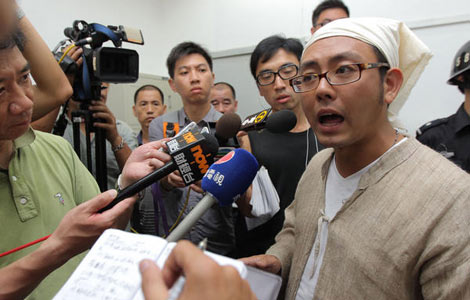Official loses post for his sound bite
Updated: 2011-08-11 07:55
By Chen Xin (China Daily)
|
|||||||||||
|
![Zhang Chuanshi, a farmer in Changle, Fujian province, shows a bottle of medicine on Aug 8 that he carries with him to cure the throat disease he says resulted from pollution. A local enviroment bureau chief was fired for chastising a reporter who tried to interview him about the alleged pollution. [Wei Peiquan / For China Daily] Official loses post for his sound bite](../../images/attachement/jpg/site1/20110811/0013729e48090fad5bf708.jpg) |
|
Zhang Chuanshi, a farmer in Changle, Fujian province, shows a bottle of medicine on Aug 8 that he carries with him to cure the throat disease he says resulted from pollution. A local enviroment bureau chief was fired for chastising a reporter who tried to interview him about the alleged pollution. [Wei Peiquan / For China Daily] |
XIAMEN, Fujian - A government official in East China's Fujian province has been suspended from his post because he chastised a reporter over the phone, local authorities said.
"A telephone recording that includes the sentence 'A bureau chief's phone number should not be called by the public' was proved to be reproducing words spoken by Chen Guiguang, the Changle city environmental protection bureau director, and Chen was suspended from his post," said a statement on the website of Changle city government on Tuesday.
A local TV reporter called Chen Guiguang in late July, trying to ask him about a settlement in a pollution case that had occurred in the city. The reporter's request for an interview was rejected.
"You shouldn't be calling my number," Chen said to the reporter, according to video footage posted on a micro blog by the TV station on Aug 4.
"If everybody could call me whenever they wanted, wouldn't that mean a bureau chief is worth nothing?
"My number shouldn't be called by ordinary people. Why should my phone be reachable by people in the public like you?"
Chen's words quickly drew much attention.
A netizen said a civil servant's duty is to serve the public and that Chen's ugly but "honest" words might mean that it is time for officials like Chen to take some "medicine".
Another said Chen's haughty attitude at least proved that he was not worthy of his wages, which came from money collected from taxpayers.
In contrast to Chen, Chinese officials in many places have tried to make their phone numbers available and have welcomed both suggestions and complaints.
In 2008, Kunming city, in Yunnan province, had local newspapers publish the office numbers of the mayor and of bureau chiefs at the city, district and county levels. Local residents hailed the decision and experts later said it helped to open a channel for communication between officials and the public.
Other cities in the country, Chengde and Shaoxing among them, followed suit. In March of this year, Shanxi province made public the mobile-phone numbers and e-mail addresses of 260 secretaries and directors of the Party's local commissions for discipline inspection and organization departments.
Liu Xutao, a professor with the Beijing-based Chinese Academy of Governance, said officials should not use words like Chen's. Still, one valid question in the case is whether the reporter called him on an office number or a private one.
"If it was a private number, I think suspending Chen from his post might be too heavy of a punishment," he said.
"Since civil servants are a special group of people, any punishments they receive should be imposed in accordance with the Public Servant Law. To avoid abuses of power, more should be done to better regulate the punishments that are meted out to officials who misbehave."
Liu said it is good to make the office numbers of officials public but that it is not necessary to take the same step for all officials.
He said it might be better to let the public have access only to the phone numbers of officials in departments whose work directly affects their lives.
Hot Topics
Anti-Gay, Giant Panda, Subway, High Speed Train, Coal Mine, High Temperature, Rainstorm, Sino-US, Oil Spill, Zhu Min
Editor's Picks

|

|

|

|

|

|







